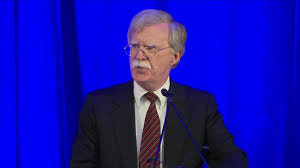John Bolton relishes in targeting nuclear arms treaties. He is very good at it.
The U.S. national security adviser’s latest hit is the Intermediate-Range Nuclear Forces (INF) Treaty, but his list of victims goes back decades. He had a hand in either the U.S. withdrawal or repeal of Richard Nixon’s Anti-Ballistic Missile Treaty, Bill Clinton’s Agreed Framework with North Korea and Barack Obama’s Iran nuclear deal.
Now he has helped put the knife into Ronald Reagan’s landmark treaty, one that broke the back of the nuclear arms race in 1987. It was the first time that the United States and the Soviet Union agreed to destroy, not just limit, nuclear weapons. Together they destroyed almost 2,700 perfectly good nuclear weapons that they had spent billions of dollars and many years building. It began the process of massive reductions in global nuclear arms that continued until the current administration.
Why is Bolton against these nuclear security treaties that Republicans and Democrats, conservatives and liberals, have championed? Because he thinks they make America weak. In 1999, he decried the liberal “fascination with arms-control agreements as a substitute for real non-proliferation of weapons of mass destruction.” A year later, he ridiculed “the Church of Arms Control.”
For Bolton and others like him, these agreements are part of the effort by the global Lilliputians to tie down the American Gulliver. In his mind, we must have maximum flexibility and multiple military options to preserve our security and interests around the world. We must protect our nation with military might, not pieces of paper.
Russia is likely in violation of the INF Treaty. It has deployed missiles near its border with Europe at ranges that exceed those allowed by the agreement. But when someone breaks the law, the answer is not to repeal the law. There are well-established methods for bringing an offending nation back into compliance. Reagan, in fact, negotiated the INF Treaty while the Soviets were in violation of the Anti-Ballistic Missile Treaty. He pushed and cajoled them for several years. After signing the INF Treaty, former Soviet leader Mikhail Gorbachev relented and shut down the offending radar. We could do the same for the INF Treaty by pushing for an agreement on mutual inspections, as many experts have suggested.
But Bolton does not want to fix the treaty; he wants to kill it. “Violations give America the opportunity to discard obsolete, Cold War-era limits on its own arsenal and to upgrade its military capabilities to match its global responsibilities,” Bolton wrote in 2014.
America will pay a high price for this rigid ideology. President Trump walking out of Reagan’s treaty is a gift to Russian President Vladimir Putin. It doesn’t fix the problem; it makes it worse. Now, there will be no restraints whatsoever on Putin’s ability to deploy hundreds of missiles, should he desire. The United States will likely be blamed for the collapse of the treaty, widening the split within the North Atlantic Treaty Organization. Europeans are already shaken by the U.S. withdrawal from the Paris climate accord, the Trans-Pacific Partnership and the Iran nuclear deal. This will increase their doubts about U.S. commitment to their security.
All this plays into Putin’s hands. It raises serious questions about whether Putin and Trump discussed this in any of their five secretive meetings. Whatever Bolton’s ideological agenda, this is certainly helping not hurting Putin’s Russia.
This goes beyond geopolitical advantage. For those who followed the arms race of the 1980s, it feels like déjà vu to again watch countries matching adversaries’ military deployments with their own in a futile effort to overcome or intimidate. And this time, it isn’t just a two-nation race. For some, the real payoff for leaving the INF Treaty is that it will allow the United States to deploy new missiles against China’s medium and intermediate-range missiles, even though we already have multiple ways to target their systems and vastly more nuclear weapons.
Thankfully, Congress has indicated that it will not idly watch as the nuclear security house burns down. Last Thursday, 10 senators, led by Sen. Jeff Merkley (D-Ore.) and including three Democratic 2020 presidential candidates, introduced legislation barring any funding for any new weapon that would violate the INF Treaty. The House is certain to follow suit.
Congressional and European pressure may yet combine to pull Trump back from this self-destructive brink. European Union Foreign Policy Chief Federica Mogherini called on Friday for both sides to stick to the treaty. “What we definitely don’t want to see is our continent going back to being a battlefield or a place where other superpowers confront themselves,” she said. “This belongs to a faraway history.”
The danger is that the INF Treaty is not the last arms control treaty to die. Many fear that Bolton has his eyes on the New START agreement that limits long-range nuclear forces. That treaty expires in 2021, unless we act to extend it. Otherwise, for the first time since 1972, there will be no limits on U.S. and Russian nuclear forces.
Bolton must be stopped before he strikes again.
(Source:Washingtonpost)


No comments:
Post a Comment